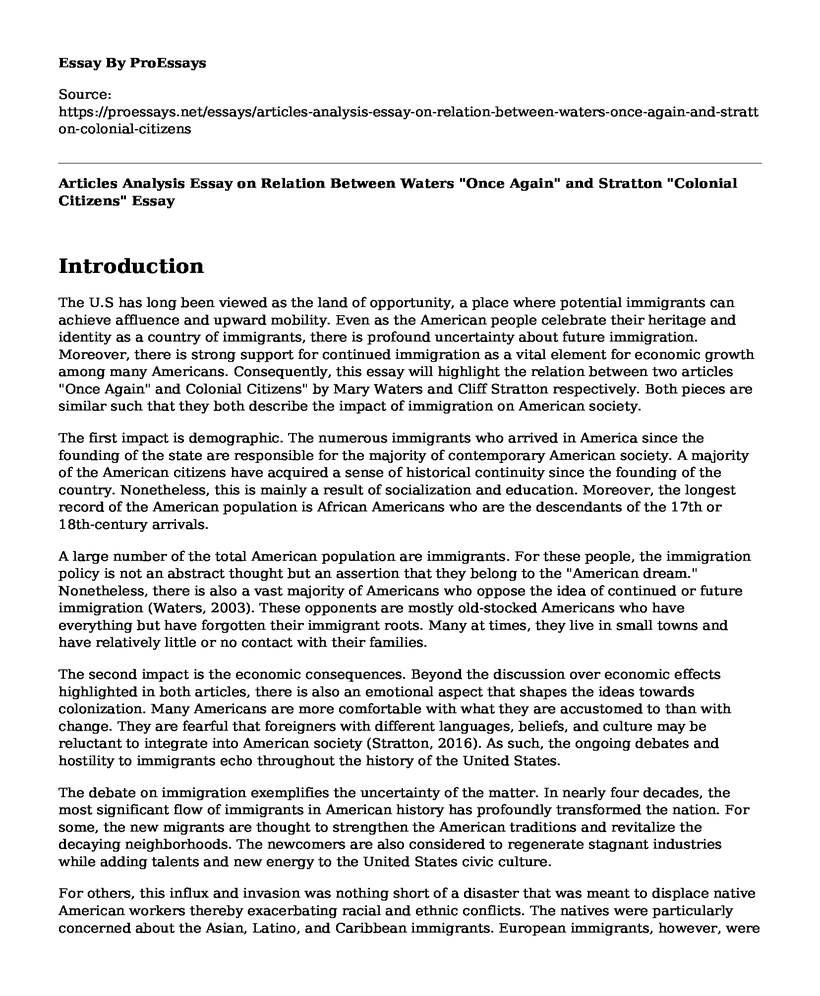Introduction
The U.S has long been viewed as the land of opportunity, a place where potential immigrants can achieve affluence and upward mobility. Even as the American people celebrate their heritage and identity as a country of immigrants, there is profound uncertainty about future immigration. Moreover, there is strong support for continued immigration as a vital element for economic growth among many Americans. Consequently, this essay will highlight the relation between two articles "Once Again" and Colonial Citizens" by Mary Waters and Cliff Stratton respectively. Both pieces are similar such that they both describe the impact of immigration on American society.
The first impact is demographic. The numerous immigrants who arrived in America since the founding of the state are responsible for the majority of contemporary American society. A majority of the American citizens have acquired a sense of historical continuity since the founding of the country. Nonetheless, this is mainly a result of socialization and education. Moreover, the longest record of the American population is African Americans who are the descendants of the 17th or 18th-century arrivals.
A large number of the total American population are immigrants. For these people, the immigration policy is not an abstract thought but an assertion that they belong to the "American dream." Nonetheless, there is also a vast majority of Americans who oppose the idea of continued or future immigration (Waters, 2003). These opponents are mostly old-stocked Americans who have everything but have forgotten their immigrant roots. Many at times, they live in small towns and have relatively little or no contact with their families.
The second impact is the economic consequences. Beyond the discussion over economic effects highlighted in both articles, there is also an emotional aspect that shapes the ideas towards colonization. Many Americans are more comfortable with what they are accustomed to than with change. They are fearful that foreigners with different languages, beliefs, and culture may be reluctant to integrate into American society (Stratton, 2016). As such, the ongoing debates and hostility to immigrants echo throughout the history of the United States.
The debate on immigration exemplifies the uncertainty of the matter. In nearly four decades, the most significant flow of immigrants in American history has profoundly transformed the nation. For some, the new migrants are thought to strengthen the American traditions and revitalize the decaying neighborhoods. The newcomers are also considered to regenerate stagnant industries while adding talents and new energy to the United States civic culture.
For others, this influx and invasion was nothing short of a disaster that was meant to displace native American workers thereby exacerbating racial and ethnic conflicts. The natives were particularly concerned about the Asian, Latino, and Caribbean immigrants. European immigrants, however, were an assimilation success story. As they rose from poverty to prosperity, earlier marked differences in education, income and occupation eventually disappeared. In this regard, the Greeks and Italians among others who were once despised were now accepted into American society.
On the other hand, the pause in immigration around the 1920s affected the flow of European immigrants for the subsequent three generations. This sharp break halted the supply of raw materials among societies. In the present day, most Italian and Polish Americans are the third or fourth generation. As more white ethics intermarried, their identity became even more weakened, and individuals have had the freedom to choose which ethnic origin to identify with.
Conclusion
Overall, both articles shed more light on the effects of immigration in the United States. As such, much of the debate over the consequences is focused on the origin of the immigrants. Each wave of the migrants was met with some degree of hostility as well as acceptance.
References
Stratton, C. (2016, January). Colonial Citizens, Deportable Citizens. Retrieved from https://www.ucpress.edu/book/9780520285675/education-for-empire
Waters, M. C. (2003). Once Again, Strangers on Our Shores. Retrieved from https://publishing.cdlib.org/ucpressebooks/view?docId=kt696nc808&chunk.id=ch06&toc.depth=1&toc.id=ch06&brand=ucpress
Cite this page
Articles Analysis Essay on Relation Between Waters "Once Again" and Stratton "Colonial Citizens". (2022, Dec 22). Retrieved from https://proessays.net/essays/articles-analysis-essay-on-relation-between-waters-once-again-and-stratton-colonial-citizens
If you are the original author of this essay and no longer wish to have it published on the ProEssays website, please click below to request its removal:
- Should the U.S. Government Decriminalize Drugs? - Argumentative Essay
- Police Brutality Against the African Americans Essay
- Race and the Criminal Justice System: Racial Profiling Essay Sample
- Essay Example on Making Foreigners: Exploring American Citizenship & Alienage
- Essay Example on Tragic Death of Tiger Keeper Raises Questions on Captive Wildlife Space
- Exploring Intersectionality: How it Empowers the Disabled - Essay Sample
- Essay Example on Global Women's Health: Mamma Seesay's Story







